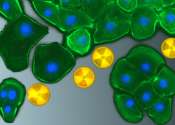Neutrons are a hot new way to measure the temperature of electronic components
From LEDs to batteries, our lives are full of electronics, and there is a constant push to make them more efficient and reliable. But as components become increasingly sophisticated, getting reliable temperature measurements ...









